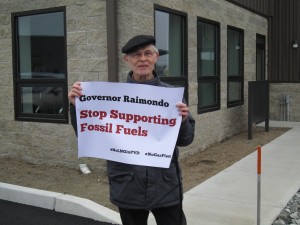The last couple of weeks produced a flurry of advisory opinions on Invenergy’s power plant proposal. The list is here in the Public Utility Commission docket. I should have read all of these documents, but I have not and may never. Why should we keep critiquing the emperor’s clothes knowing full well that he has none?

“Sure it’s retro, but you have to go where the business is.”
I did start reading the advisory opinion of the Rhode Island Department of Environmental Management. I keep getting distracted, as I am reminded of sections of Mary Wood’s Nature’s Trust. Take this:
Bureaucratic acronyms and techno-jargon give a ready-made veil to ongoing political manipulation, operating to ward off oversight from judges, journalists, environmental groups, and citizens. Every environmental agency uses dozens or even hundreds of acronyms that blather an alphabetic mix meaningless to the public. Clean Air Act regulations, for example, display the acronyms BACT, BART, MACT, RACT, SIP, NSPS, NSR, CEMS, HAPS, LAER, NESHAPS, PPM, NAAQS, PSD, TAMS, VOC, and dozens of others. Regulations under the Resource Conservation Recovery Act use UST, TSDF, TCLP, SQG, MCL, LQG, HSWA, CAMU, CAS, CESQG, and many more. Encasing agency decisions in an impenetrable vocabulary, this mumbo jumbo goes far in shielding bureaucrats from outside scrutiny.
In the opinion I struggle with I read about API, AST, COA, MDNR, MTBE, NSA, OPC, PUD, PW-3A, RIRPP, RIWAP, ROW, SAS, SDM, SGCN, ULSD, … There is no excuse for this kind of writing: word processors for decades have given users the ability to expand their abbreviations.
Collectively, we have spent countless hours exposing the science missing in these opinions. Unfortunately, very little of what is relevant is consistent with the statutes that govern the process. As Mary Wood puts it:
Despite its original goals, environmental law now institutionalizes a marriage of power and wealth behind the veil of bureaucratic formality.
Indeed, the evidence gushes off the page in the documents of our hallowed process. The problem is not that the professionals of the various departments do not understand the science. The problem is that they are—undoubtedly much to their chagrin—subordinate to politically appointed masters. They are subject to statutes that reflect decades of industry insider subversion of the Clean Air and Clean Water Acts.
Government as a whole is failing. The short version of the story is that the White House serves at the pleasure of the fossil fuel industry. The same applies to our state leadership, the majority of Congress, and our state legislature.
Two government branches down, one to go. Mary Wood explains what happened to the third, the judiciary. It has largely excused abandoned its fiduciary duty to preserve Nature’s Trust for present and future generations. Mary Wood lists the following problems:
- Closing the gates: the standing doctrine—To win a law suit you must have standing: you have to show that you have a personal stake in the outcome of the suit you bring. Apparently, in the world of our revered American law schools, we’re all from outer space and have no stake in the health of this planet.
- The judicial deference syndrome—Supposedly, regulatory agencies have technical expertise and objective scientific facts on their side. Thus, the courts shy away from “micro-managing” these bureaucracies. Of course, the courts disregard that many decisions that are presented as scientific are products of political pressure and a process captured by industry.
- Narrow (often procedural) grounds—Ecological matters are rarely the issue in court. What counts is whether the process followed its often ambiguous and arbitrary rules and regulations. The courts end up dealing with form rather than substance.
- The ineffectual remedy—When a court case is occasionally won, the winner must, once again, spend limitless resources to implement the often inadequate remedies.
- The remote public—by the time the chainsaws, bulldozers, and dynamite arrive, people are still trying to master the acronyms, but the process has already ended. It’s too late.
The Rhode Island process puts our politically appointed Director of the Department of Environmental Management in an impossible position, inaccessible behind a firewall on the Energy Facility Siting Board. Corrupted statutes silence the experts in the various departments, but the statutes have done their dirty work and the upshot is clear and all we have is:
- A process inconsistent with the “duty of the general assembly to provide for the conservation of the air, land, water.”
- A process designed to clothe the villainy of naked capitalism.
Almost five years ago, when the Providence Journal was still a local newspaper, Bob Kerr wrote one of his famous columns, one headlined “Mysterious end to career of helping:”
Andrew Winters did good and important work at the University of Rhode Island that few others could do. He helped students come in from some very cold places. He worked to change attitudes that often took the form of hard and hateful things yelled from car windows or scrawled on doors.
Two of URI’s former students have not forgotten and shared their dismay in this month’s issue of Options, Rhode Island’s free LGBTQ Community Magazine.
One letter to the editor is from a former URI psychology student, Gary Burkholder, who received a Distinguished Achievement Award from the URI Alumni Association in 2014—see page 12 of Options.
After writing about his experience with Andrew’s work at URI, which “greatly contributed to the evolution of the LGBT climate on the University of Rhode Island Campus,” Gary ends with:
Some day the full story will be told and he [Andrew] will be an unquestionable and integral part of it.
The letter to the editor on the facing page 13 is by Aja VanDyke, another former URI student. She starts by mentioning:
September 2016 marks the fifteenth anniversary of the inception of the URI GLBT Center; Rhode Island’s first campus center for LGBTQ people. The Center was established to provide education, advocacy and support, and it did so for students, faculty, and other Rhode Islanders.
The community center no longer exists on the URI campus in Adams Hall. Andrew Winters, the man who created it, was bullied out of his career …
Aja ends with:
Many of us see the retaliation that has been done to Andrew and Don [his husband] because of their LGBT advocacy, including the continuing official coverup, as a hate crime.
You can read the full letters in Options.
Of course, there is nothing mysterious about the coverup, nor about the fact that URI President Dooley welcomed an investigation in public, while he squashed it behind the scenes. Whether it is workplace bullying, 38 Studios, or the “unexpected” failure of the Keable/Fogarty Burrillville power plant bill, that’s how we do the People’s business in Rhode Island.
Let me end on a positive note and wish Jen Stevens the best of luck as she departs Options as Editor in Chief. Thank you, Jen, for your dedication and hard work!
]]> As part of the process, RIDOH issued an advisory opinion. Even a cursory reading of the document reveals issues so serious that they should prevent the construction of CREC. Yet another Rhode Island administrative body that lacks enthusiasm for the project!
As part of the process, RIDOH issued an advisory opinion. Even a cursory reading of the document reveals issues so serious that they should prevent the construction of CREC. Yet another Rhode Island administrative body that lacks enthusiasm for the project!
RIDOH identifies serious negative health impacts of noise:
According to the WHO [World Health Organization], sleep disturbance, one of the most common complaints raised by noise-exposed populations, can have a major impact on health and quality of life. People can recognize and react to sounds, even when asleep. Those reactions, including wakening and changes in sleep stage, are associated with daytime after-effects, such as sleepiness, reduced cognitive and motor performance, and impairment of cardiovascular function.
The RIDOH opinion also quotes written testimony of Julia O’Rourke, who lives on Wallum Lake Road in Burrillville:
Specifically, in the past year, I have experienced excessive noise and vibrations coming from the Algonquin Compressor Station site which this project will be located next to. The noise and vibrations emanating from this site are extremely disruptive and negatively impacting our health and we are unable to sleep or enjoy the peace and quiet of our home. I am concerned that the noise levels and vibration are only going to increase during the construction and operational phase of this project.
Clearly, the neighborhood around the CREC site and Spectra Energy’s compressor station will become unlivable. RIDOH suggests, if the plant were to be built, that Spectra Energy and Invenergy install sound proofing and buy “properties subject to noise levels that cause serious annoyance and/or sleep disruption.”
RIDOH’s opinion mentions that questions have also been raised as to whether National Ambient Air Quality Standards (NAAQS) of the Environmental Protection Agency adequately protect public health. We, and probably others, indeed raised those questions—those and quite a few others—in this public comment. The federal standards fail to account for short-lived pollution spikes which are typical for the operation of compressor stations and power plants. Nitrous oxides are are highly problematic in this respect. In addition, there are lots of other problems with “data” Invenergy’s submitted to the Energy Facility Siting Board.
Sure, we could go ahead with the construction of the power plant and turn Burrillville into a major air pollution dump. Is that justified simply to create a couple of jobs and export electricity to the Northeast? Can we justify that simply because “no states have promulgated a short-term NO2 standard that is more stringent than the NAAQS and the process for adopting such standards is arduous?”
Interestingly, RIDOH is much more advanced in its understanding of the effect of the proposed power plant than the Rhode Island Office of Energy Resources. RIDOH states:
The burning of fossil fuels and the extraction of fossil fuels by “fracking” both contribute to climate change by emitting various greenhouse gases to the atmosphere, most notably carbon dioxide and methane. Both have the effect of harming the health of Rhode Islanders now and in the future.
Of course, most of the methane problem occurs long before the fracked gas reaches Rhode Island. Information in a recent presentation of Rhode Island’s Office of Energy Resources shows that the office explicitly ignores such effects.
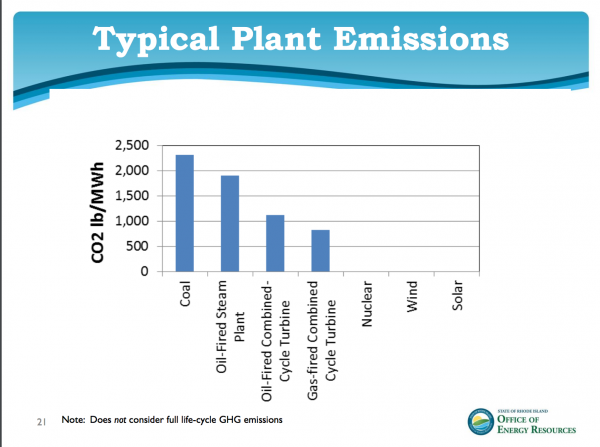
Not only does the office ignore basic science, it is also out of sync with federal guidelines on how the effects of greenhouse gas emissions on climate change should be taken into account. Those guidelines, issued last week, explicitly call for:
- Taking into account reasonably foreseeable direct, indirect, and cumulative GHG emissions and climate effects;
- Consideration of reasonable alternatives and the short- and long-term effects and benefits in the analysis of alternatives and mitigation
Unless we change course, Rhode Island will be doing neither. RIDOH writes:
We cannot measure the direct contribution of the proposed plant, or of any single facility, to public health by means of climate change.
Sure, but if we forge ahead without understanding what we do, we are in violation of the precautionary principle of the Rio Declaration, an international treaty signed and ratified by the U.S. This is the supreme law of the land:
Principle 15
In order to protect the environment, the precautionary approach shall be widely applied by States according to their capabilities. Where there are threats of serious or irreversible damage, lack of full scientific certainty shall not be used as a reason for postponing cost-effective measures to prevent environmental degradation.
How about we cannot “measure the direct contribution” of the plant to global warming? True enough, but we can easily estimate the impact of the national policy of which construction of the plant is part. Because natural gas is worse for the climate than oil and coal, the conclusion is simple: given the rate at which natural gas escapes unburned, and before the use of methane starts paying off, we’ll be dead, leaving an uninhabitable planet for future generations.
]]>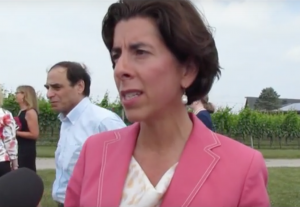 Future water shortages caused by CREC have been a topic of discussion and speculation for many months. That indeed there is a serious risk is clear from information contained in documents obtained from several Rhode Island departments in response to Fossil Free RI‘s request made under the Access to Public Records Act.
Future water shortages caused by CREC have been a topic of discussion and speculation for many months. That indeed there is a serious risk is clear from information contained in documents obtained from several Rhode Island departments in response to Fossil Free RI‘s request made under the Access to Public Records Act.
As a reminder, the following is worth quoting from a previous post based on documents supplied by the RI Department of Health:
According to a presentation at a meeting about CREC attended by several state agencies, 0.18 MGD (million of gallons of water per day) will be left for growth if the power plant is built. June Swallow of the Center for Drinking Water Quality at the Rhode Island Department of Health attended the meeting. Her longhand notes show that Harrisville and Pascoag each are expected to need 0.12 MGD for growth. This suggests a deficit of 0.24 MGD – 0.18 MGD = 0.06 MGD.
Also documents supplied by the RI Department of Environmental Management raise concern. There is, for example, the following email exchange between Alisa Richardson of RIDEM and Ken Burke formerly of the Rhode Island Water Resources Board:
Thanks Alisa,
I think we should talk about having the Town acknowledge that with low flow conditions and high energy demands, that the Town is effectively pledging most (if not all) of its available water to this development. This local decision is theirs to make. Will someone from the Town also be at this meeting?
Thank you,
Kenneth J. Burke, P.E.MBA
General Manager/Treasurer
This email (my emphasis) appears on page 50 of this document. There is more of interest, but the conclusion is the same; search the document for “Alisa” and “Ken.”
Also Stephanie Sloman, a retired environmental engineer who worked for a large electroplating plant in Massachusetts, weighed in. She submitted a thorough and detailed testimony to the Invenergy docket of the Energy Facility Siting Board.
Her conclusion is that, no matter how you look at it, there is not enough water for future growth in Burrillville and the other towns that draw from the same source.
Clearly, the RI departments of Environmental Management and Health, and the Water Resources Board are aware of the looming water supply problem. As Stephanie Sloman explains, anyone capable of elementary arithmetic can check this. As she points out, Invenergy is apparently is not one of those.
Recently, Gina Raimondo mentioned that she would withdraw her support for the CREC project if there were any issues. Of course, trouble with the water supply is only one of a myriad of issues each single one of which should suffice for her to make good on that promise.
]]>According to a presentation at a meeting about CREC attended by several state agencies, 0.18 MGD (million of gallons of water per day) will be left for growth if the power plant is built. June Swallow of the Center for Drinking Water Quality at the Rhode Island Department of Health attended the meeting. Her longhand notes show that Harrisville and Pascoag each are expected to need 0.12 MGD for growth. This suggests a deficit of 0.24 MGD – 0.18 MGD = 0.06 MGD.
Invenergy is one of the largest corporations in the growing “clean energy” business. Of course, the Clean Power Plan, the US implementation of the Paris Agreement, not only fails to reduce greenhouse gas emissions. It also does irreparable harm to fracked communities and the environment by polluting air and groundwater.
 These may not be issues the people of Burrillville have direct control, but they should be aware of the water supply problems that may come with the megawatt power plant proposed by Invenergy.
These may not be issues the people of Burrillville have direct control, but they should be aware of the water supply problems that may come with the megawatt power plant proposed by Invenergy.
Water usage has received some attention, but the question has not been addressed transparently, while public disclosure and discussion have been in short supply.
As Invenergy’s proposal states:
Water supplied to the Facility will be provided from the Pascoag Utility District (PUD) by re-activation and treatment of a currently inactive PUD groundwater well that became contaminated in 2001 by an off-site contamination source. As a result of this well-documented groundwater contamination event, PUD was forced to terminate is use of its primary well water supply and interconnect its water supply system with the Harrisville Fire District (HFD) to meet the requirements of its customers for potable water.
To find out what the Raimondo administration is planning, Fossil Free Rhode Island filed requests for documents under Rhode Island’s Access to Public Records Act. Such requests for information went to the Departments of Environmental Management (RIDEM) and Health, to the Water Resources Board (WRB), and to the Offices of the Governor and of Energy Resources.
As many have noticed, the Raimondo administration, following the lead of its federal Big Brother, is rather secretive. Indeed, the administration responded for the most part by withholding documents based on an overly broad interpretation of what information is exempt from disclosure.
Although, Fossil Free RI made some progress lifting the veil of secrecy, RIDEM and the WRB must have better and more detailed data than present in the documents obtained so far. Such information is available from their Streamflow Depletion Methodology.
Water resource management is complex and there is ample opportunity for debate. There is, for instance, the problem that water resource projections require somewhat arbitrary choices as to what is the relevant watershed. Rivers have tributaries, which in turn have tributaries, and so on, just as in this nursery rhyme:
Big fleas have little fleas,
Upon their backs to bite ’em,
And little fleas have lesser fleas,
and so, ad infinitum.
As one increases the size of the watershed, one decrease the shortage problem, but the number of impacted communities increases.
However this may be, and even without considering the lingering issue of the MTBE contamination of the Pascoag wells, the water supply raises important questions:
- Are the Burrillville Town Council and its planner aware of the implications of the power plant for their future? How about the townspeople and nearby communities?
- How does a potential water shortage feature in the tax negotiations of the Burrillville town council with Invenergy?
- Can the Burrillville Town Council refuse permission to Invenergy to construct the required water supply pipeline?
- Why is this issue not addressed in this letter from the Burrilville’s town solicitor to the town manager.
- Does the Pascoag Utility District need approval of an amended and extended water management plan in accordance with the Water Resources Board’s Rules and Procedures for Water Supply System Management Planning?
- If so, will there be an opportunity for public comment and if so when?
There is another serious concern about good government. Rhode Island state law provides the WRB with the authority to allocate water among all users, one of which is the environment. Fossil Free RI’s request for public documents has made it painfully clear that this pivotal agency has been reduced to a shadow of its former self. It is no secret that this is due to underfunding.
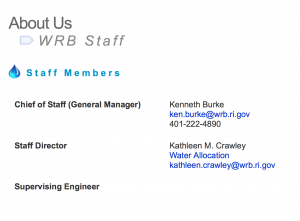
Indeed, an email with a request for documents to the WRB’s chief of staff, Ken Burke, resulted in an automatic reply with the message that he no longer works for the agency. Also the position of the supervising engineer seems to be vacant. Obviously, the funding situation is so bad that the WRB even lacks staff to update its web page.
The people of northwest Rhode Island are entitled to a public process with full disclosure. They have to the right to be informed on how much water is available to their community and how developments such as CREC will impact their future. The WRB is a vital, yet clearly dysfunctional element of this process.

In response to Fossil Free RI’s request for infomation, the Division of Legal Services of the Department of Administration, which now seems to represent the WRB, sent a handful of irrelevant documents. In contrast, RIDEM responded with a past-deadline request for a twenty-days extension because of the “voluminous nature” of the material requested.
The inconsistency of these responses all by itself speaks volumes, but the most “entertaining” response came from the Office of the Governor:
Thank you for emailing Governor Raimondo!
Governor Raimondo is committed to open, accessible and accountable government.
The Governor’s Office made good on this commitment by sending Fossil Free RI a mountain of documents completely unrelated to the request.
]]>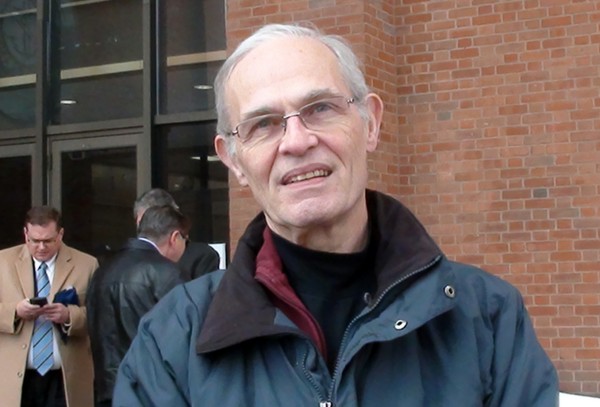
[The following is the testimony presented by Professor Peter Nightingale at the hearings for Energize RI’s carbon tax bill (H 7325) introduced by Representative Aaron Regunberg.]
I would like to thank the sponsors of the Energize RI Act for putting carbon tax on the table. This is important legislation, but I cannot support the bill in its current form.
My main objection is that the bill under-taxes natural gas by a factor of 5 to 10, precisely when a perfect fracked-gas storm is about to hit RI:
- The Raimondo administration is pushing for a one GW fracked-gas fired power plant in Burrillville.
- National Grid is asking the Federal Energy Regulatory Commission for a permit to build an LNG liquefaction facility at Fields Point.
The Office of Energy Resources will be in charge of large parts of the implementation of this bill. I know from conversations with people in that office that they do not understand that fracked gas is worse for the climate than coal and oil on the time scale that matters.
The Office of Energy Resources bases itself on federal numbers, but:
- EPA has systematically underestimated the amount of natural gas that escapes unburned.
- EPA fails to account properly for the fact that methane is a much more powerful greenhouse gas than carbon dioxide.
- Undoubtedly, these numbers also pollute the REMI study which, as a consequence is likely to overstate the greenhouse gas reduction that this bill will produce. [See also:
A study of pricing carbon pollution: reality or fiction?]
Indeed, “Methane Leaks Erase Climate Benefit Of Fracked Gas, Countless Studies Find,” was the tittle of a recent publication. This was sparked by a recent Harvard study that found an increase in U.S. methane emissions from 2002–2014. The increase was more than 30% from 2002-2014.
By under-taxing fugitive methane by roughly a factor ten, this bill unintentionally favors natural gas infrastructure development relative to fossil fuels with a smaller greenhouse gas potential. That is precisely the disaster that the Raimondo administration is planning in Burrillville.
Rhode Island cannot solve the emission problem by itself, but we should have a carbon tax bill that can be copied by other states. The Energize Rhode Island Act fails this test.
Please see my lack of support for the Energize RI Act as constructive criticism, and thanks again for your much appreciated efforts.
]]>Deprecated: Function get_magic_quotes_gpc() is deprecated in /hermes/bosnacweb08/bosnacweb08bf/b1577/ipg.rifuturecom/RIFutureNew/wp-includes/formatting.php on line 4387
The Energize RI Act is about to take a big step forward: the hearing in front of the House Environment and Natural Resources Committee is planned for March 10th at the Rise of the House (details below). We need you to support the bill alongside over fifteen expert witnesses who will be demonstrating why carbon pricing is a win-win solution. Read on to learn more about the hearing, or shoot us an email, and we’ll help you draft your own testimony for the bill.
The goals of the bill are admirable:
(4) Reduce public health, public safety, economic, and natural resource impairment risks associated with climate change; and
(5) Meet the state emissions goals for 2035 as set by the “Resilient Rhode Island Act” in 2014.
Fortunately, the bill has various provisions that will address the problem that Camus summed up as: “It is no more immoral to directly rob citizens than to slip indirect taxes into the price of goods that they cannot do without.” To put it differently: we should be taxing the upper income brackets at the 1950s level of more than 90%.
The carbon tax collected under the Energize RI Act will be used as follows:
- 25% will be used for climate resilience, energy efficiency and conservation, and renewable energy programs that benefit low-income residential and small business properties.
- 30% is to be used to provide direct dividends to employers.
- 40% shall be used to provide direct dividends to residents.
- There will be 5% for administrative overhead.
Item #1 is an attempt to deal with the well-known criticism of a revenue neutral carbon tax:
If you want to maximize the economic benefit of those carbon tax revenues, it is widely known that public spending/investment is a better approach. Multipliers for public investment are much higher than for tax cuts.
One may wonder whether, as is the case in Connecticut, installing more natural gas will be counted as part of item #1: “Switching to natural gas couldn’t be easier,” Evensource advises its customers and then refers them to the Green Bank for financing. Would you put something like that past Governor Raimondo’s step-on-the-natural-gas Office of Energy Resources?
It’s wonderful to see that we are having this discussion and that our legislators continue to think seriously about how to deal with climate change. I certainly appreciate the efforts of the sponsors of the Energize RI Act, Representatives Regunberg, Handy, Carson, Tobon, and Bennett.
Undoubtedly, experts will testify about the success of British Columbia’s carbon neutral tax bill. Before we get too excited about an attempt to duplicate the BC success story in RI, it might help to look at the following graph, which is from a post with the ominous title “British Columbia’s Carbon Tax and ‘Leakage’ Into the U.S.”
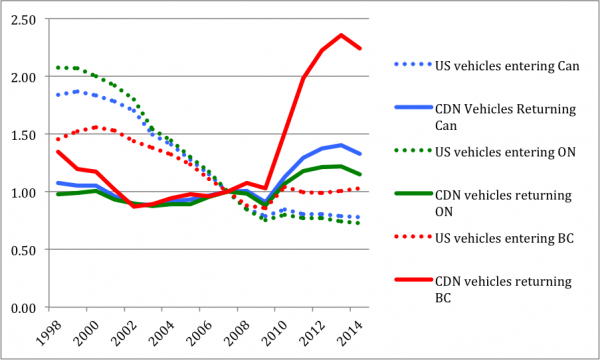
As the post states:
The chart makes it clear that there was a giant surge in Canadian vehicles crossing from British Columbia into the United States (solid red line) starting shortly after introduction of the BC carbon tax (in mid-2008).
If this kind of leakage occurs in British Columbia, what do you expect for a small state like Rhode Island? The only feature of the bill that might avoid this problem is the tax itself: $15 per ton of CO2e. That boils down to ¢13 per gallon of gas. No sane person would believe that such a minimal tax will even remotely phase out fossil fuels. The bill may start a trend that might be followed by neighboring states, which indeed is the only way to avoid the “leakage” problem.
But, if setting a trend is the idea, it better be the right trend and this is the major problem with this bill. It contains a tax for methane that escapes unburned even out of state. That the bill recognizes this problem is a majors step forward, but the details matter. Getting so-called fugitive methane completely wrong is precisely why the national Clean Power Plan is a disaster.
According to the latest estimates, 12% of natural gas escapes and this is what is responsible for the fact that natural gas is worse for climate change than coal and oil for the next 50-100 years. Read more about this in Methane Leaks Erase Climate Benefit Of Fracked Gas, Countless Studies Find.)
To tax fugitive methane, the Energize RI Act will rely on numbers provided by the Energy Information Administration (EIA). The RI Office of Energy Resources, which will be responsible for the implementation of this part of the Energize RI Act, will rely on bad EIA numbers.
Even this February’s EPA publication (see page E13, line 13) still uses outdated numbers for the global warming potential of methane and amortizes its effect over next century. We only have about a decade, if even, to avoid a climate catastrophe. For more about time scales and the fugitive methane problem see Precaution the new aggression.
The EPA has a long history of underestimating fugitive methane. The upshot of these errors is that the Energize RI Act might set a trend of under-taxing fugitive methane by roughly a factor ten. Exxon Mobil —#ExxonKnew, our nation’s biggest fracker— undoubtedly loves this trend! None of this should come as a surprise: the head of EPA has been a political appointee since its inception in 1970. The good news is that I’ve been told that, if the Act is passed this year, its sponsors will try to amend it to fix the flaw in the present act.
Here are a couple of thoughts to end with. Ponder Wendell Berry observation:
Whether we and our politicians know it or not, Nature is party to all our deals and decisions, and she has more votes, a longer memory, and a sterner sense of justice than we do.
Let’s put in the context of climate science. As Hansen and Sato reiterate in their latest publication, Regional climate change and national responsibilities:
- Humanity must reduce its emissions by 5-7% per year as of today to stop the wild dash off the climate cliff.
- We, the industrialized carbon-debtor nations, have already outspent our greenhouse gas budget.
Finally, to add to your sense of reality, watch Hansen’s latest video, but don’t share it with the kids!
As part of the “FANG needs YOU: To protest Governor Raimondo to confront Governor Raimondo” campaign, I went to the NORAD event to confront our governor about her support for fossil fuels.
When the governor passed, I asked her about the cost of the proposed gigawatt, fossil-fuel fired plant in Burrillville, aka the Clear River en Energy Center. Holding up my sign, I said: “Nice jobs program, Governor, $2.3 million per job. How do you justify that?” Even from within six feet, she did nor see nor hear a thing!
We seem to have a trend here, as observed by Lorraine Savard, who staged a respectful bird-dogging presence at the Cherry Blossom event at the State House earlier the same day. Referring to Governor Raimondo, Lorraine observed: “She is either ignoring me or she is afraid to look me in the eye.”
You’d expect that Governor Raimondo has friends who would be quite able to invest the $2.3 million for a comfortable early retirement of the 300 workers who might benefit from the construction without creating a sacrifice zone. But I’m loosing my thread.
I had the pleasure to exchange a couple of words with our senators and representatives. When I asked Congressman Cicilline if he was planning to join us in opposing the power plant, he replied that Burrillville was not his district. True enough, but not all that gutsy. Fortunately, he agreed with me when I replied that it was not my district either, but my world.
The NORAD celebration made twitter buzz; @QuonsetRI:
@jimlangevin: I never get tired of coming down to @QuonsetRI for these great announcements
One of Representative Langevin’s staff told me, when I asked his boss about Burrillville: “This is a different event, Peter.” I have to sleep on that one.
Unfortunately, Mike Miranda, private owner of NORAD, did get tired with me and my off-topic message. He asked me to leave the event, which he referred to as private. The press was there and my impression was that the public was invited, but I left. Do you blame me when I wonder how much state and federal money is spent on shuttling our leadership to and from these “private” events?
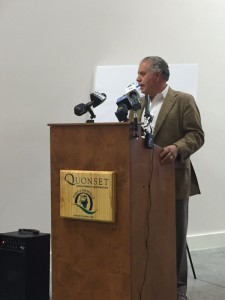
One final tweet from @QuonsetRI:
Mike Miranda, CEO & Pres. of NORAD: We’re likely only port in country w/ 7 diffrnt manufacturers snding cars here
Undoubtedly, what you see in the picture are all electric cars that soon will run on electric power generated by Invenergy’s fracked-gas power plant in Burrillville. We call those “zero-emission” emission vehicles and that’s how we implement the Paris Accord and the #CleanPowerPlan. Unfortunately, not only here in Rhode Island.

 Aubry McClendon, ousted CEO of Chesapeake Energy Corp, was indicted on Tuesday for conspiring to rig bids to buy oil and natural gas leases in Oklahoma. The indictment is the result of a four-year antitrust investigation by the US Department of Justice.
Aubry McClendon, ousted CEO of Chesapeake Energy Corp, was indicted on Tuesday for conspiring to rig bids to buy oil and natural gas leases in Oklahoma. The indictment is the result of a four-year antitrust investigation by the US Department of Justice.
Let’s revisit some of the prehistory. McClendon was among the scam artists who took the White House for a wild ride on the natural-gas bridge to nowhere. Recall Obama’s 2012 State of the Onion address celebrating the founding of Saudi America:
… oil is not enough. This country needs an all-out, all-of-the-above strategy that develops every available source of American energy. [thunderous applause] A strategy that’s cleaner, cheaper, and full of new jobs. We have a supply of natural gas that can last America nearly one hundred years.
McClendon’s scheme was simple:
- Lease land throughout Greater Frackonia.
- Drill in the sweets spots.
- Pretend that the gushing wells are representative.
- Flip the leases before the buyers realize that the productivity of a typical fracked well is far worse and tends to decay by a factor of ten within three years.
Obama bought into McClendon’s scam. From there it trickled down via Rhode Island’s Congressional delegation, led by Senator Sheldon Whitehouse. Next, the snake oil flowed to Rhode Island’s Office of Energy Resources, with Commissioner Marion Gold blazing the fracking trail for Team Raimondo.
Janet Fire Wall Coit, hapless director of the Department of Environmental Management, is collateral damage of the tragedy. She is implicated by the bizarre Rhode Island statute that puts her on the Energy Facility Siting Board and makes her part of the “regulatory” process that will decide the fate of Invenergy’s proposal for a gigawatt fossil fuel power plant in Burrillville.
Recently, Steve Ahlquist raised the question why the siting board is in such a hurry to push through Invenergy’s proposal. One part of the answer is that McClendon’s gig is up; his co-conspirators know that their time is running out. The other reason to make haste is Saudi Arabia’s frontal attack on Saudi America by means of the current oversupply of oil, aka Oilmageddon. The title of this post on DeSmogBlog says it all: “Top Drillers Shut Down U.S. Fracking Operations as Oil Prices Continue to Tank.” Of course, Chesapeake is one of those.
No surprise that all of this coincides with the precipitous drop in Spectra Energy’s stock since the middle of 2014. This is the corporation that will be the main supplier of fracked gas for Invenergy’s stranded asset-to-be in Burrillville. Fortunately, Team Raimondo is ready to bail out Spectra by creating a market for its gas and by selling Rhode Island down the “Clear River.”
Guess who will be paying the bill for the construction of this power plant? We the people of Rhode Island, of course! It’s joke of cosmic proportions that there will be a 38 Studios hearing to begin at 4:30pm this Thursday in room 101 of the State House.
Thanks, Team Raimondo! We love you as you step on the gas in Burrillville to create 300 fleeting jobs. Special thanks also to you, Rhode Island AFL-CIO, for your support for “Clear River” in your October 2015 resolution
Hey, only $2.3 million a job. How do you beat that?
Note added to original post: Aubrey McClendon, 56, Ex-Chief of Chesapeake Energy, Dies in Crash a Day After Indictment
]]>In its latest rating, Politifact analysed the question: “Could methane be worse for the climate than coal?“ They quote my URI colleague, geoscientist David Fastovsky:
But without appropriate historical context, he says he isn’t ready to say that fracked gas is worse for the climate than coal. That is a very aggressive statement to make, he says.
Is he awaiting the historical “oh oops, we just passed yet another tipping point?” The question about the effect on the climate of the national policy of methane as a bridge fuel came up in a position paper of the RI Environmental Justice League. The paper shreds National Grid’s proposal for an LNG liquefaction facility at Fields Point in Providence. This is about public policy, health problems, poverty and environmental racism, not ivory-tower science.
Maybe by “appropriate historical context” David Fastovsky means that in reaching a verdict on methane as a bridge fuel one has to decide whether we count on having a decade or a century to avoid climate chaos. If so, I agree and I’ll get to that issue.
During the last 13 months, I was arrested twice in FANG fracked gas actions. One act of civil resistance was my refusal to leave Senator Sheldon Whitehouse’s office until he ended his support for fracked gas—he still has not, to the contrary. The second arrest was after locking down with my pediatrician friend Curt Nordgaard as we blocked the Spectra Energy Gates of Hell in Burrillville, RI.
I took this “very aggressive” stance even though I knew full well that there is an infinitesimal chance that regulation will prove Cornell University’s Robert Howarth and coworkers wrong. Underlying their work is a judgement call about time scales. Howarth addresses this explicitly in his paper A bridge to nowhere: methane emissions and the greenhouse gas footprint of natural gas.
Rather than reciting the full abstract of Howarth’s paper, we often say: “Methane is worse for the climate than coal and oil.” Yes, this is a short-cut, but does the media ever have time for the fully qualified truth? No, concision is what they want!
 Here is my take on the question of time scales. If I look at the 2015 Arctic Report Card and how fast that part of the world is warming up, I conclude that the relevant time scale for climate tipping points is very likely to be a decade, not a century. Not convinced? Read this: Thresholds and closing windows: risks of irreversible cryosphere climate change with its:
Here is my take on the question of time scales. If I look at the 2015 Arctic Report Card and how fast that part of the world is warming up, I conclude that the relevant time scale for climate tipping points is very likely to be a decade, not a century. Not convinced? Read this: Thresholds and closing windows: risks of irreversible cryosphere climate change with its:
Never has a single generation held the future of so many coming generations, species and ecosystems in its hands.
Politifact quotes Raymond Pierrehumbert of the University of Chicago. He implies that, because of methane’s short (about ten years) life time in the atmosphere, the effects of methane on the climate are reversible. I disagree, but let James Hansen speak:

I asked glaciologist Jay Zwally if I would be crucified for a caption such as: “On a slippery slope to Hell, a stream of snowmelt cascades down a moulin on the Greenland ice sheet. The moulin, a near-vertical shaft worn in the ice by surface water, carries water to the base of the ice sheet. There the water is a lubricating fluid that speeds motion and disintegration of the ice sheet. Ice sheet growth is a slow dry process, inherently limited by the snowfall rate, but disintegration is a wet process, spurred by positive feedbacks, and once well underway it can be explosively rapid.” [emphasis added]
Zwally replied “Well, you have been crucified before, and March is the right time of year for that, but I would delete ‘to Hell’ and ‘explosively”’.
The principle of practical irreversibility is sound, but the estimated time of arrival in Hell cannot be predicted accurately. I spent most of my scientific carrier studying these kinds of “explosive” instabilities. Take my word for it: there will be no reliable prediction until after the fact.
There is not a word in Politifact’s analysis about the numerous references in the discussion about threats to the climate system starting on page 108 of this compendium, but the real problem with Politifact’s rating is that it is ethically challenged. It is blind to the precautionary principle, which says that the burden of proof that a public policy is not harmful falls on those who want implement it. As a worthy member of the corporate media, Politifact reverses the burden of proof and puts it on the People.
Stated differently, Politifact fails to address how one makes a moral choice in the absence of certainty. Suppose we knew that the probability that Howarth is correct is 10%? (I think it’s over 90%, but that is not the point.) Would “only 10%” justify ignoring the risk, continuing business as usual and expanding the fossil fuel infrastructure?
Would you play Russian Roulette with a ten-shot revolver with one bullet? Does the expected survival of 9 out of 10 players reduce to 10% the truth value of the statement that this game is lethal?
Do we demand certainty in our perpetual war decisions? Of course not; Cheney’s One-Percent Doctrine prescribes war to avoid risks at the 1% level, but no such doctrine is applied to protecting the biosphere. The ruling class will survive climate change just fine —thank you!
Politifiction, here is your homework assignment. Rate this statement in the President’s Climate Action Plan:
“Burning natural gas is about one-half as carbon-intensive as coal […]”
Hint: notice that there’s not a word about fugitive methane nor about the destruction visited upon communities near the wellheads, the pipelines, the railways and across the globe.


